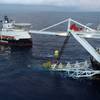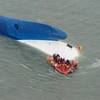DNV GL Holds Hearing Ahead of New Rules Launch
More than 800 customers and stakeholders will receive the new DNV GL rules today as part of an external hearing process before their publication and entry into force. According to DNV GL, the rules are the signature of the classification society, forming the basis of the organization and playing an essential role in its work to make the maritime industry safer, smarter and greener.
The merger of DNV and GL brought together a set of competencies, cultures and histories that stretch back 150 years – embodied in the rule sets of the two organizations. The formation of DNV GL represented a unique opportunity to undertake a comprehensive review, update and integration of the rules.
COO of DNV GL – Maritime, Knut Ørbeck-Nilssen, who will take on the role of CEO in August, stated, “From the beginning of this project, we wanted these rules to be unique in the way they reflected industry experience and input. So our objective has been to have our customers and stakeholders deeply involved throughout the development and implementation process. Already, at the recent Nor-Shipping trade fair we signed several joint development projects with leading yards to work together with us to ensure the rules deliver the quality, safety and process efficiency our customers expect.”
Rules for classification need to be practical, clear, consistent and easy to use. So the decision was made to have the structure of the rules complement the typical design process. To give shipyards and designers starting out on a new project an easy entry point 38 Ship Type Class Notations have been defined. All ship type related requirements are now found in one place.
“One of the areas where we truly believe the rules will set a new standard for the industry is in the hull structure rules. The new advanced load concept is a major step towards a more realistic representation of the environmental loads,” said Geir Dugstad, Head of Division Classification in DNV GL – Maritime.
“Along with our state-of-the-art capacity models, this concept will increase the consistency in the safety level applied for the complete hull structure. In addition, this approach will also accommodate the challenges related to development of novel and unusual designs. They could be a real game changer for our customers.”
Once DNV GL has received the feedback from its customers and stakeholders from the hearing, this input will be processed and incorporated into the rules. The launch and publication of the rules is expected to take place in October 2015 and the new DNV GL rules will enter into force on January 1, 2016.

















